Catalog 2012-2014 - Anderson University School of Theology
Catalog 2012-2014 - Anderson University School of Theology
Catalog 2012-2014 - Anderson University School of Theology
Create successful ePaper yourself
Turn your PDF publications into a flip-book with our unique Google optimized e-Paper software.
Faculty and Student Organizations, continued<br />
COMMUNITY LIFE<br />
• Seminary Community Council: The Seminary Community Council is the vehicle<br />
through which the <strong>School</strong> <strong>of</strong> <strong>Theology</strong> plans its common life <strong>of</strong> fellowship and service.<br />
Task groups implement corporate expressions <strong>of</strong> witness and service, devotional, social,<br />
recreational, and publication activities. This Council is guided by the Office <strong>of</strong> Student<br />
Development.<br />
• Qara (Women in Ministry): Qara provides opportunities for women to become an<br />
integral part <strong>of</strong> the seminary community, to relate with all individuals within the community,<br />
to reflect on what it means to be a woman and a minister in the church, and<br />
to explore and communicate crucial issues regarding individuals in ministry. The seminary<br />
website contains detailed information and resources about this ministry program<br />
to the church.<br />
Pre-Seminary Education<br />
It is not possible to prescribe one pattern as normative for all pre-seminary education.<br />
Widely varying emphases and settings <strong>of</strong> ministry encourage a variety <strong>of</strong> educational backgrounds.<br />
Nonetheless, it is possible and desirable to identify categories <strong>of</strong> learning which typically are foundational<br />
for graduate theological education.<br />
• Effective communication skills: Effective communication skills are essential for both<br />
interpreting and communicating the faith <strong>of</strong> the church. The ability to read, write, and<br />
speak standard written English is vital. Students are also encouraged to have a reading<br />
knowledge <strong>of</strong> at least one language other than English. It is highly desirable that a reading<br />
knowledge <strong>of</strong> Greek and Hebrew be developed as a basic tool for meaningful graduate<br />
theological education. Additional language skills might be essential, depending on vocational<br />
intent and the setting <strong>of</strong> potential ministry.<br />
• Liberal arts or humanities: General understandings <strong>of</strong> human selfhood and existence,<br />
modern social institutions and problems, culture and religion, science and technology,<br />
and the modes <strong>of</strong> understanding are helpful in theological education. A considerable<br />
degree <strong>of</strong> competence should be developed in one or more <strong>of</strong> the categories <strong>of</strong> learning<br />
noted above. Such competence <strong>of</strong>ten is represented by a major in a field such as philosophy,<br />
sociology, psychology, or history <strong>of</strong> civilization. Students are expected to have<br />
had some academic experience in the fields <strong>of</strong> philosophy, sociology, psychology, and<br />
history.<br />
• Theological or religious studies: Theological understandings <strong>of</strong> major religious traditions<br />
and the contemporary questions <strong>of</strong> values and faith in the context <strong>of</strong> the humanities<br />
and communication skills is important. Knowledge <strong>of</strong> the nature and content <strong>of</strong> the biblical<br />
materials is <strong>of</strong> particular significance as a foundation for graduate training in Christian<br />
ministry.<br />
<strong>Anderson</strong> <strong>University</strong> <strong>School</strong> <strong>of</strong> <strong>Theology</strong> <strong>Catalog</strong>, <strong>2014</strong>-2015 17



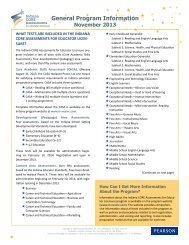
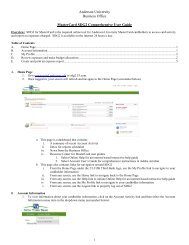
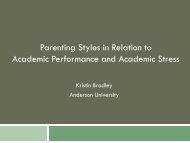
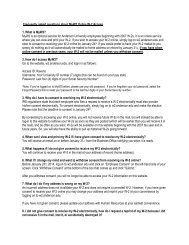
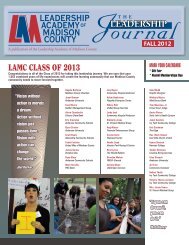
![Brand Continuity Guide [PDF] - Anderson University](https://img.yumpu.com/45286018/1/184x260/brand-continuity-guide-pdf-anderson-university.jpg?quality=85)
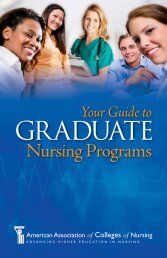
![Affidavit of Support [PDF]](https://img.yumpu.com/41163197/1/190x245/affidavit-of-support-pdf.jpg?quality=85)
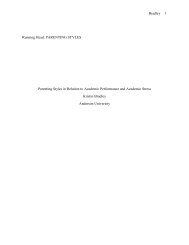
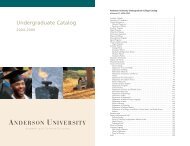
![Employment Interest Form [PDF] - Anderson University](https://img.yumpu.com/36433548/1/184x260/employment-interest-form-pdf-anderson-university.jpg?quality=85)
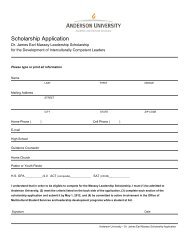
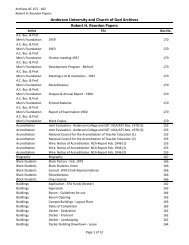
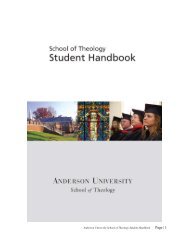
![the Recommended Reading List [PDF] - Anderson University](https://img.yumpu.com/34123085/1/190x245/the-recommended-reading-list-pdf-anderson-university.jpg?quality=85)